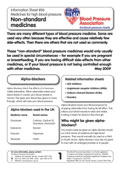Alpha-blockers are a type of medicine that can be used to treat high blood pressure.
They work by allowing the blood vessels to relax and widen, so the blood has more space to flow through. They include doxazosin, indoramin, prazosin, and terazosin.
How do alpha-blockers work?
Alpha-blockers block the effects of the hormones adrenaline and noradrenaline. They stop them from being detected by the blood vessels walls.
Adrenaline and noradrenaline are part of the flight or fight response. One of their effects is making the muscles in your blood vessel walls contract, making the blood vessels narrower so your blood has less space to flow through. This raises your blood pressure. Alpha-blockers allow your blood vessels to relax and widen, making it easier for blood to flow through.
Who can take alpha-blockers?
If you have high blood pressure, your doctor or nurse might suggest you take medicines to lower it. It can take some trial and error to find the right one or the right combination.
Alpha-blockers are usually used if other drugs are not working well or are not suitable for you. For example, if you have side effects, have other health problems or are taking certain medications. They’re not usually one of the first one’s you’ll try because other medicines seem to be better at protecting you from a heart attack or stroke, and at treating heart failure. Alpha-blockers are usually prescribed by a specialist.
They can be used if you have a rare tumour of the adrenal gland called a phaeochromocytoma, which raises blood pressure. They are also used by men with an enlarged prostate gland to make it easier to urinate (pee).
When are alpha-blockers not suitable?
Alpha-blockers are not suitable if you’re pregnant, planning to get pregnant, or breastfeeding. They’re also not usually given to women as they can cause stress incontinence (leaking urine when you cough or sneeze for example) and loss of bladder control.
They’re not usually used if you have had postural hypotension in the past – where your blood pressure drops too low when you go from sitting to standing up – or if you have ever fainted after urinating (peeing). They also won’t be suitable, or you might need closer monitoring, if you have heart failure or heart disease or have had a stroke, liver or kidney problems, or you have Parkinson’s disease.
They shouldn’t be taken alongside PDE5 inhibitors (used to treat erectile dysfunction) and anti-depressants, as they can cause a sudden drop in blood pressure if taken together.
Your doctor will consider your overall health and any treatments you’re having before giving you any new medicines.
Do alpha-blockers have side-effects?
All medicines can have side effects, including blood pressure medicines. It’s likely you won’t have any side effects at all with alpha-blockers, or you might have some that are minor and don’t cause you too many problems, and will usually pass within a couple of weeks.
If you have side effects which don’t improve and are affecting your day-to-day life, you should be able to try a lower dose or a different medicine.
Possible side-effects of alpha-blockers include:
- a sudden drop in blood pressure when you go from lying or sitting down to standing up (postural hypotension)
- headaches
- nausea
- dizziness
- drowsiness, tiredness, weakness or feeling lethargic
- swollen legs or ankles
- sleep disturbance
- tremor
- rash or itchiness of the skin
- rarely, they may cause problems with erections in men
The leaflet that comes with your medicine will have a full list of possible side effects.
Taking alpha-blockers
They’re usually taken as tablets or capsules, between one and three times a day.
Check with your doctor or pharmacist before taking any other medicines at the same time as alpha-blockers, as they can interact, including medicines you buy over the counter such as painkillers and anti-inflammatories.
If you start taking high blood pressure medicines, it’s likely you will need to keep taking them for the long term. If your blood pressure stays under control for several years, you might be able to take a lower dose or stop taking them altogether.
It’s important that you don’t simply stop taking alpha-blockers because your blood pressure will quickly rise again. Always let your doctor, nurse or pharmacist know if you’re struggling because there could be other options you can try.
Read more
Non-standard medicines for high blood pressure information sheet
 Download our Non-standard medicines information sheet [PDF 23,510KB].
Download our Non-standard medicines information sheet [PDF 23,510KB].

